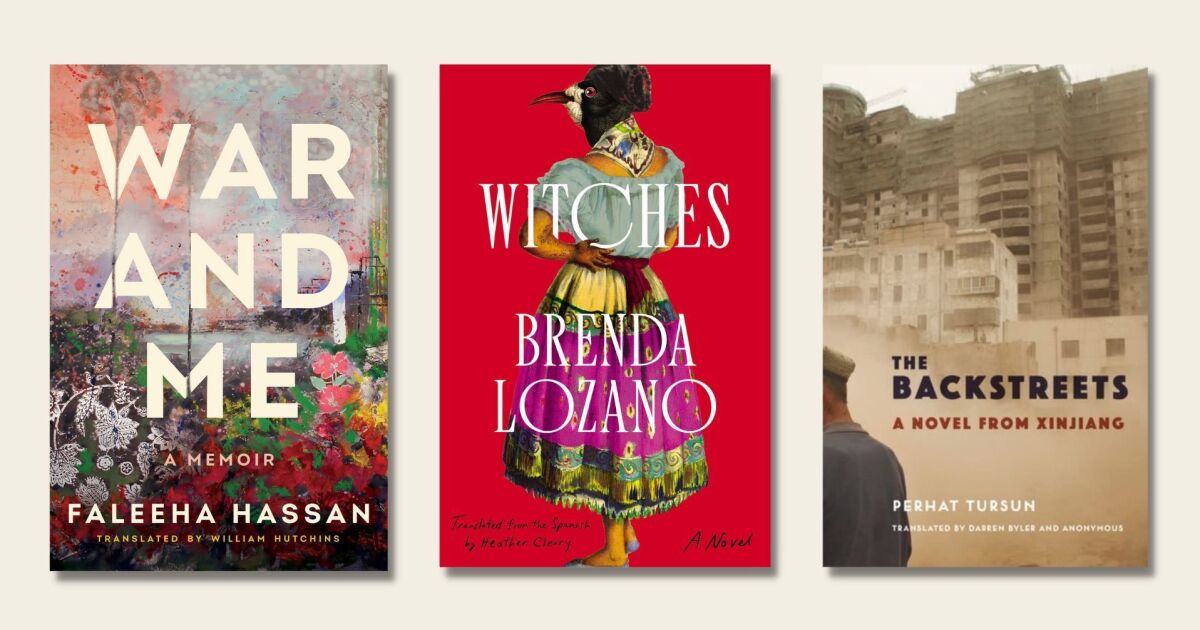
When I write roundups of books that have been translated into English, I often concentrate on choosing works that play well together. I've focused on the surreal and the creepy -- and highlighted the role of the translator and the colonial history of the author's country.
Although the U.S. has miles to go in terms of publishing international literature, there's still an abundance of newly translated works to choose from — so linking books by theme or genre can help narrow the focus. But also, I am always wary of treating translation as its own genre: I never want to pretend that books are similar, or related, by virtue only of not having been written in English first.
All that said, today's books have almost nothing in common. For these three books — Iraqi poet Faleeha Hassan's memoir War and Me; Mexican novelist Brenda Lozano's Witches; and Uyghur novelist and social critic Perhat Tursun's The Backstreets -- their commonalities are very broad: All three books engage explicitly and intensely with injustice, and all three are terrifically written and translated. Beyond that, they need nothing to unite them. Each stands out on its own merits.
War and Me by Faleeha Hassan, trans. William Hutchins
At the start of War and Me, Faleeha Hassan, a major Iraqi poet now living in exile in New Jersey, writes, "[N]ext to my name in the Unknown World or beside it at the moment I was born, the only comment inscribed must have been: 'Faleeha Hassan will coexist with war for most of the years of her life.'" Her memoir is the tale of that coexistence, which includes the Iran-Iraq War, Iraq's invasion of Kuwait, both George Bushes' invasions of Iraq, and the 1990 United Nations sanctions against Iraq, which Hassan sees as economic warfare that "resulted in our suffering pitiful hunger, deprivation, and exposure to various maladies." But rarely does Hassan tell her story from a wide political vantage. Instead, her narrative is highly personal and lushly detailed. She proceeds in purely chronological order, starting at her birth and writing her way up to the present day — a mode that can seem artless, especially if you're used to the highly focused, novelistic memoirs that are in style these days, but that is all the more successful because it seems so natural. Reading War and Me often feels like listening to a new friend tell her life story, complete with jokes, dreams, and detours.
Hassan offsets her chatty narrative with bursts of lyrical language, especially on the too-often-twinned subjects of love and war. As a girl, she imagines the Iranian army "besiege[ing] all of us like some giant serpent." Later in the Iran-Iraq War, when she falls briefly in love with a soldier named Anwar, the romance has an effect that astounds her: "For the first time since 1980, I felt I was inhaling air imbued with peace." Unfortunately, in War and Me, peace is nearly always inner, and nearly always ephemeral. Reading it is, for that reason, as infuriating as it is moving. It's impossible not to want better for Hassan and her family before the first chapters are done.
Witches by Brenda Lozano, trans. Heather Cleary
I'm usually wary of novels that alternate narrators. Often, one narrator is more winning or more fully developed than the other, and I find myself speeding through half the story to get back to my preferred protagonist. Not so in Brenda Lozano's Witches, which braids the life story of a Zapotec curandera named Feliciana with that of Zoe, a reporter who travels to interview Feliciana after her cousin Paloma, who taught her to heal, is murdered for being Muxe, a third gender American readers would understand as trans. Zoe and Feliciana sound nothing alike — a real feat on both Lozano and Cleary's parts. Feliciana's sections are looping and abstract, while Zoe's are as clipped and sharp as any journalist's writing would be. The contrast between them is irresistible. At the end of each Feliciana chapter, I was excited to return to Zoe's voice, and vice versa.
Witches' swift, intertwined narrative never elides Feliciana and Paloma's life in rural southern Mexico with Zoe's life in Mexico City. Still, their proximity — and Zoe's plain desire to learn from Feliciana — cannot help but highlight their shared experiences as women making their own way in a world too often defined by male desires. Paloma, who had "wings where other people have regrets and fears," was Feliciana's model of joyful resistance; Feliciana, who believes that "you can't really know another woman until you know yourself," becomes a model for Zoe. Lozano writes their stories, and their growing connection, with such warmth that often reading Witches feels like sneaking into Feliciana's house with Zoe. By the end, the novel feels like a community.
The Backstreets by Perhat Tursun, trans. Darren Byler and Anonymous
In 2017, while Darren Byler was translating Perhat Tursun's The Backstreets, his co-translator — who, he writes in his introduction, was "a young Uyghur man who was in a position very similar to [Tursun's] protagonist: an underemployed, alienated young migrant who had recently left his job due to systemic discrimination" — disappeared, likely into one of the Chinese government's reeducation camps. A year later, Tursun himself was detained and has vanished into the same system. The Backstreets is an agonizing testimony to the anti-Uyghur policies and prejudices that led to their disappearances. It is also good writing of the sort that makes me feel like somebody has wrenched my head 90 degrees to the left: It's both clear and disorienting, an utterly new way of describing the world.
Of course, this isn't to say The Backstreets is without precedent. Tursun's modernist tale of a man wandering an illegible, hostile city — Ürümchi, the capital of Xinjiang — is plainly influenced by Albert Camus' The Stranger and Ralph Ellison's Invisible Man. Yet it's also characterized by a level of empathy and optimism that Camus, especially, would find alien. Early in the book, as the nameless narrator walks through streets so fogged with pollution that Ürümchi seems to "fade into the dimness of imagination," he passes a man muttering, "Chop the [Uyghur] people from the Six Cities, chop, chop, chop, chop..." As a reader, I was terrified; the narrator, however, tries for several paragraphs to understand the man, even pitying him for being so enraged that "his anger was wearing down his soul," before remembering with a jolt, "I was always-already the one [the man] was going to chop." This memory of prejudice defines the narrator's life.
He refers to himself often as "me, a Uyghur man," as if reminding himself how Han Chinese strangers see him. This memory can be both painful and frightening; the threat of violence hovers over the narrator like Ürümchi's ubiquitous fog. Still, he clings to his conviction that "the greatest thing in the world is living," despite what Byler describes as the grinding "work it takes for the colonized to live."
Lily Meyer is a writer and translator living in Cincinnati, Ohio.
Copyright 2022 NPR. To see more, visit https://www.npr.org.





